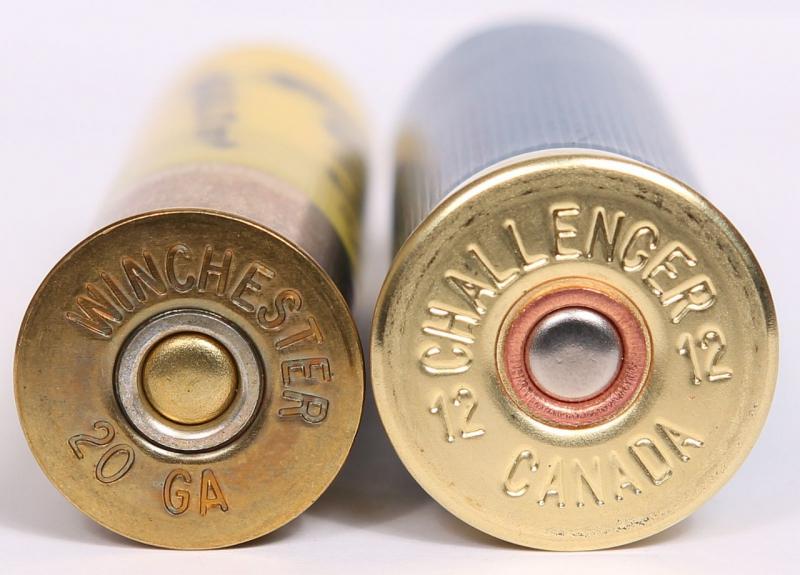01: 20 Gauge vs. 12 Gauge
A small discussion on between the characteristics between a 20 Guage and a 12 Gauge Shotgun by The Omega Man


Most people looking for a multi-purpose sporting/combat firearm to start their collection choose a shotgun. This is a wise choice as a shotgun is a powerful (more powerful than a pistol or submachine gun) close combat weapon that is still legal , and also serves as a hunting weapon (suitable for small game, big game, and waterfowl. Yes I said hunting. You're starving and the big-shots take away what little food have after the supermarkets close forever. What's more important? Animal right s? or your family's life?!!!)
The biggest controversy over shotgun selection is what gauge (ga.) to get. Just about every "informed, in-the-know, firearms 'expert'" will tell you to buy a 12 ga., giving you the reason of superior fire power. However, a 12 ga. also has a hefty recoil to it; which may be no problem if you're built like a truck-driver, but might prove to be a hassle if you're like most everyone else. Also, have you ever seen a rabbit or other small game animal after it took a direct hit from a 12 ga. at the ranges commonly encountered while small game hunting? The idea is to have something to eat after you shoot the critter; not obliterate the beastie. For these reasons one might want to go down a size and get a 16 or 20 ga. shotgun. Of the two the more popular gauge is 20, a versatile size usable for many different tasks. Of course though the 20 ga. doesn't have the "firepower" of the 12, but is having all the stopping power of the 12 really necessary when you can't hit the broadside of a barn with one due to the recoil? No, since the 20 in hands familiar with it (and I hope you're proficient with your weapons for your own sake!) can get the job done!
The 20 gauge has the following advantages over the 12: - The 20 ga. has less recoil. This adds up to better confidence with the weapon; you're not afraid of it. This means you'll hit the target. Even if you can handle a 12 in the field, what about in your house when some scumbag is breaking in your house, and you're nervous and half asleep? Can you take a pistol gripped 18 1/2" barrel 12 ga. (the standard home defense configuration), and deal with the recoil well enough to aim it around a corner with one hand and still be able to hit a target 20 feet away well enough to put it out of action while being shot at, or rushed with a tire- iron? All the stopping power of that 12 ga. won't do diddley if you can't hit anything with it. You could also lose the altercation which most definitely wouldn't be a good scene.
- Despite the fact that it has less stopping power than a 12 ga., the 20's stopping power is still more than adequate to get the job done. If you don't think so then why don't you let someone shoot you with one. The 20's reduced stopping power is also better for small game hunting, your mainstay in a survival situation. A 12 will quite often totally render any small animal hit with it unusable for human consumption, if there's anything left! A 20 ga. is also suitable for taking big game by a proficient hunter.
- A 20 ga. shotgun and it's ammo is lighter than a 12 ga. This allows for easier carrying in the field, as well as more ammo to be brought along. This enables you to survive firefights longer, bag more game while hunting for a period and gives you extra "insurance" if something unexpected happens, and you need to let a couple rounds fly.
Of course it also has some disadvantages.
- More types of specialized ammo is available for a 12 ga.; including certain riot control ammo such as rubber shot.
- The 12 ga.'s extra firepower adds a little insurance while hunting big game.
- At this time more 12 ga. ammo is lying around. You'll have better luck scrounging it up after the shit hits the fan.
- The barrel end of a 12 ga. commands more respect; although this professional (and hopefully the reader too) wouldn't mess with someone who confronted him with ANY type of shotgun if he wasn't better armed. (ie a high-powered rifle being used at least 200 yards away, or an already deployed shotgun or assault rifle)
Both the 12 and 20 ga. each have their own advantages and disadvantages. The thing to do is to look over both and see what's right for you, but don't go out and buy something because someone told you that xxx type is the ultimate macho man choice, and the only thing you should get, because what will happen is you'll be stuck with something you can't use effectively when you need it, and the main point of proper firearm selection is to get something you'll be comfortable and effective with. Use that criteria in determining your choice between 20 and 12 ga., and you won't go wrong.
For more info on the 20 ga. alternative read:
20 gauge: The All-Around Shotgun, by Jon R. Sundra
February 1985 Guns & Ammo magazine
Less Gun is More Gun, by Durwood Hollis
1989 Annual Guns & Ammo magazine






















